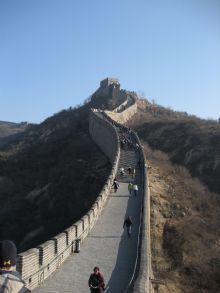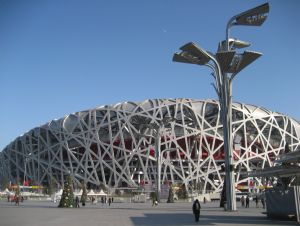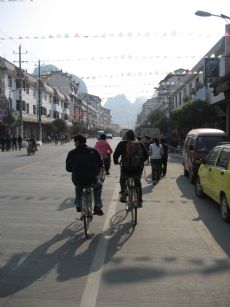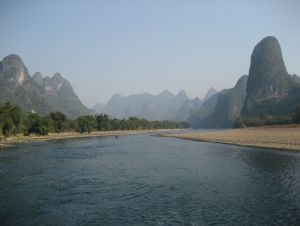China: Tradition and Change - Winter Term '09
February 18, 2009
Talk to one of the 23 DePauw students who went to China during Winter Term in January and you will wish you had gone too. Led by Professor of History Yung-chen Chiang and his wife, Li-feng Chiang, part-time instructor of Chinese, the students experienced a study tour of the most populated country  of the world that included the Great Wall built more than 2000 years ago and the Bird’s Nest in the Olympic Village built last year. They had plenty to ponder in regard to the trip’s theme – China: Tradition and Change.
of the world that included the Great Wall built more than 2000 years ago and the Bird’s Nest in the Olympic Village built last year. They had plenty to ponder in regard to the trip’s theme – China: Tradition and Change.
The itinerary was impressive, planned for an adventurous and energetic soul. It included a walk along the Great Wall, a tour of the Forbidden City, a private tour of the Olympic Village, tickets to the Beijing Opera and to an acrobatic show in Shanghai, a visit to the Terra Cotta Army Museum in Xi’an, a bike ride in Yangshou, eating dim sum in Hong Kong and more. The group made stops in Beijing, Xi'an, Guilin, Shanghai and Hong Kong.
Pucong Han ’11 is from Beijing and was there working over Winter Term. Professor Chiang had made arrangements for the group to meet with him. Han and his family hosted the group for an afternoon and toured the city together.
The course description states, “The purpose of the trip is to enable students to have a better appreciation of how history continues to matter in China and to see the dramatic economic transformation taking place which is evident in the reshaping of the landscape, skyscape, and, most importantly, the lives of the people.”
transformation taking place which is evident in the reshaping of the landscape, skyscape, and, most importantly, the lives of the people.”
“One thing that I will never forget,” remembers William “Will” T. Catton ’11, “is driving through the smog to get to the Great Wall. We passed huge factories pouring out smoke, and the next thing I knew, we were in the countryside among the hills looking up at the Great Wall.”
Management Fellow Nicholas “Nick” E. Kennedy ’10, a double major in economics and communication said, “I developed a huge interest in China last summer after the Olympic games.” He chose this Winter Term trip because he thought it would be a chance of a lifetime: he wasn’t disappointed. Kennedy reflects, “From day one, the trip was incredible!”  Kennedy noted how well the trip was organized and what a great team the Chiangs made. Yung-chen Chiang has taken almost 200 students to China in eight trips, and Li-feng has joined him on four of those trips.
Kennedy noted how well the trip was organized and what a great team the Chiangs made. Yung-chen Chiang has taken almost 200 students to China in eight trips, and Li-feng has joined him on four of those trips.
In Beijing, Deborah Seligsohn and Arthur Kroeber spoke to the students about China’s politics, economics, social and environmental issues. Seligsohn is the director of the China program at the World Resources Institute and was a student of professor Yung-chen Chiang when Chiang was a graduate teaching fellow at Harvard University. Kroeber is managing director of Dragonomics, an independent research and advisory firm specializing in Chinas economy and its influence on Asia and the world.
Later that day the students visited Tsinghua University which has an exchange program with DePauw. The students met with a professor and six students of Tsinghua's English department and discussed a wide-range of topics including curriculum, campus life, study habits and the Olympics.
Yung-chen Chiang is a University Professor, professor of history and chair of the history department. He teaches courses on Chinese and Japanese history. Chiang is the author of, Social Engineering and the Social Sciences in China, 1919-1949, published by Cambridge University Press.
Li-feng Chiang is part-time instructor of modern languages (Chinese).
Winter Term takes place each January between fall and spring semesters. It reflects DePauws serious commitment to non-traditional, experiential learning. Winter Term is a time of adventurous, intellectual exploration in an atmosphere with a reduced emphasis on grades. Each year, DePauw faculty and staff members offer a plethora of incredible opportunities for students. Visit the Winter Term 2009 Web site for a comprehensive list of this year's courses.